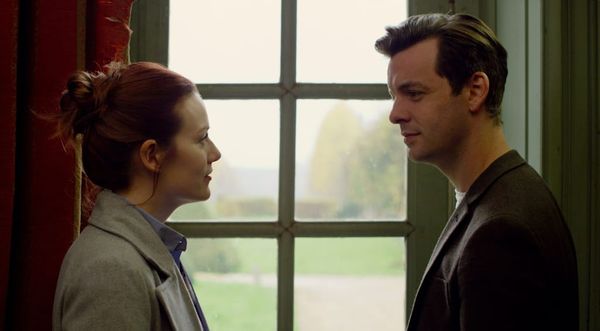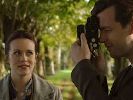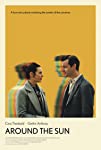Eye For Film >> Movies >> Around The Sun (2019) Film Review
Around The Sun
Reviewed by: Jane Fae

Around the Sun is many things. Odd. Endearing. Vaguely romantic. Quirky. Studied. An exercise in thoughtful filmmaking and…about as far from your standard Hollywood fare as it is possible to get.
The action centres on a dilapidated manor in Normandy, France. Here, in the late 17th century, the film intimates, took place a series of encounters and conversations between a gallant philosopher – stand-in, perhaps, for author-cum-Scientist Bernard le Bovier de Fontenelle - and a high-born lady, la marquise.

This discourse is set out in Fontenelle’s Entretiens Sur La Pluralité Des Mondes (Conversations On The Plurality Of Worlds ). It is an interesting mix of science and knowing romance. As far as the science goes, it provides a defence of the heliocentric world view set out a century or so previously by Nicolaus Copernicus.
Yet by introducing more than a hint of courtly flirtation in the to and fro between philosopher and lady, it delivers an easily accessible, popular treatment of a complex subject. This, in turn, found favour with the female audience, its primary target.
Add, too, that this was one of the first science books written not in Latin, the language of the Church, but in French, and Entretiens proved not just Fontenelle’s ‘magnum opus’ but also one of the first major works of the Age of Enlightenment.
So what has a 17th century work of philosophy to do with a film about a young man, Bernard (Gethin Anthony) being shown round a manor house by bank representative Maggie (Cara Theobald)? Well, everything, really.
The original Entretiens is a multi-layered work proposing not just a new science of the planets, but also an interplay between heavenly bodies and earthly romance. So the film riffs back and forth between Fontenelle’s ideas and the real life encounter taking place in the present day. Or rather, encounters. And conversations.
For the film provides not just a single narrative strand but multiple strands. The same encounter is played out more than once. Because in the multiverse, implied by the 'plurality of worlds', every possible combination of events takes place in every way imaginable. Is that good or bad? Is it positive to imagine that right now, in another universe, we are experiencing the same situations as here, but with less success? Or does that mean that somewhere else we are doing better? Should we mourn our loss? Or accept our gain?
The film is a slow build, not helped by an initial awkwardness between the first versions of Bernard and Maggie that we encounter. There is also the sense that we are watching a play transferred direct to screen. The dialogue has, at times, a stilted, even Shakespearean feel.
Get used to it. For the overall aim of director Oliver Krimpas and writer Jonathan Kiefer appears to be as much about the artful discourse that sits at the heart of the film. Art? Or artifice? Yes: it is a film about how two people get together romantically. Or perhaps how they do not get together. But it is also very much a film about a book and about some quite difficult philosophical concepts within that book.
It is interesting: intellectual; and if you are alive to the possibilities of philosophy, will make you think. More, if you have access to it online or on disc, I can imagine those who enjoyed it wanting to go back and watch again and again, to understand better where it is going. What point it is making.
This is a film designed to tickle the brain, rather than provoke extreme emotion. Not, I would guess, for anyone looking for the latest blockbuster action movie for the weekend. But I enjoyed it.
Reviewed on: 08 Aug 2020

















